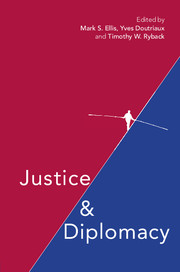 Justice and Diplomacy
Justice and Diplomacy Introduction
Published online by Cambridge University Press: 16 February 2018
Summary
- Type
- Chapter
- Information
- Justice and DiplomacyResolving Contradictions in Diplomatic Practice and International Humanitarian Law, pp. 1 - 6Publisher: Cambridge University PressPrint publication year: 2018
